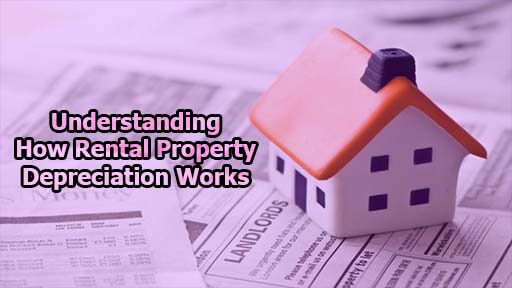Understanding How Rental Property Depreciation Works:
One of the most important aspects of owning a rental property is understanding how depreciation works. By definition, depreciation is the decrease in value of an asset over time due to wear and tear, or obsolescence. In the context of rental property, depreciation is crucial for maximizing profits and reducing taxes. In the rest of this article, we are going to present with you, an understanding of how rental property depreciation works.
Why Understanding Rental Property Depreciation is Crucial for Maximizing Profits?
Understanding depreciation allows you to accurately calculate the value of your property and its cost basis for tax purposes. This knowledge can help you reduce your taxable income, which in turn increases your net rental income.
What does the Term Depreciation, mean for Rental Property?
Depreciation for rental property is an accounting method used to spread out the cost of a property over its useful life for tax purposes. This means that the cost of the property can be deducted each year as an expense, rather than all at once.
Defining Depreciation: Depreciation is the decrease in the value of an asset over time. For rental property, this means deducting the cost of the property each year as an expense.
Why Rental Property Depreciation is Relevant?
Rental property depreciation is relevant because it can significantly reduce taxes owed and increase net rental income.
Different Depreciation Methods:
There are two main methods of depreciation for rental properties: straight-line depreciation and accelerated depreciation.
1. Straight-line depreciation: This method evenly spreads the cost of the rental property over its useful life. It assumes that the property’s value depreciates by an equal amount each year. The formula to calculate straight-line depreciation is:
Annual Depreciation Expense = (Initial Cost – Salvage Value) / Useful Life
In this formula, the initial cost represents the purchase price of the property, the salvage value is the estimated value of the property at the end of its useful life, and the useful life is the expected number of years the property will generate rental income.
Straight-line depreciation provides a consistent and predictable reduction in the property’s value each year.
2. Accelerated depreciation: This method allows for a larger depreciation expense in the early years of the property’s life, reflecting the concept that assets typically lose value more quickly in their early years. The two common accelerated depreciation methods are:
a. Double declining balance (DDB): This method applies a depreciation rate that is double the straight-line rate. It results in higher depreciation expenses in the early years, which gradually decrease over time. The formula to calculate annual depreciation using the DDB method is:
Annual Depreciation Expense = (Net Book Value – Accumulated Depreciation) * Depreciation Rate
The net book value is the initial cost minus the accumulated depreciation, and the depreciation rate is usually double the straight-line rate.
b. Modified accelerated cost recovery system (MACRS): This method is commonly used in the United States for tax purposes. It assigns different depreciation rates based on predetermined recovery periods. These periods are determined by the Internal Revenue Service (IRS) and vary depending on the type of property. MACRS allows for faster depreciation deductions in the early years, followed by a slower rate of depreciation.
Both straight-line and accelerated depreciation methods have their advantages and implications for taxes and financial reporting. It’s essential to consult with a tax professional or an accountant to determine the most appropriate method to use for your specific rental property and applicable tax regulations.
Understanding Depreciation in the Real Estate Industry:
The concept of depreciation has been used in the real estate industry for years. It has been an important factor in determining the value of properties and estimating their future cash flow.
A Historical Overview of Depreciation for Real Estate Investors: Depreciation has been a tax benefit for real estate investors since the inception of federal income taxes in 1913.
Depreciation’s Impact on Your Rental Property Income: Depreciation reduces taxable income, which in turn increases net rental income.
How to Determine the Property’s Value and Cost Basis:
Determining the property’s value and cost basis is essential to properly deducting depreciation.
Determining Cost Basis for Your Rental Property: The cost basis is determined by adding the purchase price of the property and all costs associated with purchasing and preparing the property for rental.
Expert Tips to Determine Property Value: Property value can be determined through several methods, including comparable sales, income approach, or replacement cost.
How Depreciation Affects Your Property’s Value and Cost Basis: Depreciation reduces the cost basis of the property, which can affect its value and the amount of taxes owed when the property is sold.
How Depreciation Reduces Your Taxes:
Depreciation can reduce taxes owed through deductions, which can increase net rental income.
Tax Benefits of Depreciation: Depreciation can be deducted as an expense each year, reducing taxable income and increasing net rental income.
Calculating Your Deductions with Rental Property Depreciation: Deductions for rental property depreciation can be calculated using several methods, including the straight-line method or the accelerated method.
How to Maximize Your Tax Savings with Depreciation Deductions: Maximizing tax savings through depreciation deductions involves planning ahead and accurately determining the cost basis of the property.
Recapturing Depreciation: What You Need to Know?
Depreciation recapture is an important consideration when selling a rental property.
What is Depreciation Recapture?
Depreciation recapture is the portion of gains from the sale of a rental property that is subject to taxation.
How to Recapture Depreciation on Rental Property: Depreciation recapture can be calculated by determining the cost basis of the property and subtracting it from the sale price.
Planning Ahead for Depreciation Recapture: Planning ahead for depreciation recapture involves accurately calculating the cost basis of the property and properly documenting all improvements made to the property.
Miscellaneous Topics to Keep in Mind:
There are several important considerations when depreciating your rental property.
Important Considerations When Depreciating Your Rental Property: Important considerations when depreciating your rental property include limits on deductions, risks associated with taking deductions, and how improvements affect depreciation.
Depreciation Limits for Rental Properties: There are limits on the amount of depreciation that can be taken each year for rental properties.
Risks When Taking Depreciation Deductions: There are risks associated with taking depreciation deductions, including the possibility of recapture if the property is sold.
Depreciation and Property Improvements: Improvements to a rental property may need to be depreciated separately from the property itself.
In conclusion, Understanding depreciation is essential for maximizing profits and reducing taxes when owning a rental property.
FAQs:
What is Property Depreciation?
Property depreciation is the decrease in the value of a property over time for tax purposes.
How is Depreciation Determined for Rental Properties?
Depreciation is determined by dividing the cost of the property by its useful life and claiming a portion of the cost each year.
How Does Depreciation Help Maximize Profits?
Depreciation helps maximize profits by reducing taxable income and increasing net rental income.
What Happens if I Sell My Depreciated Rental Property?
If you sell a depreciated rental property, you may be subject to depreciation recapture taxes.
Is There a Limit on Depreciation Deductions for Rental Properties?
Yes, there are limits on the amount of depreciation that can be deducted each year for rental properties.

Library Lecturer at Nurul Amin Degree College










